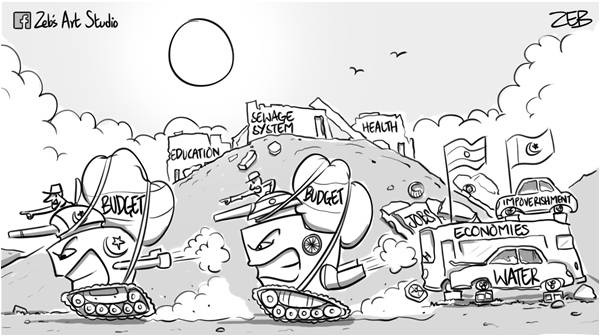
South Asian nuclear history
Sir,
Stuck with an arms race that is fuelled by India’s economic strength, what should Pakistan do? In the commentary about Pakistan’s nuclear programme, a point that is often ignored is that India went nuclear at a time when the development of nuclear power was not the direct and obvious end. China’s story comes in as a side consideration for clarification, which is an unpalatable truth. Before contemplating alternatives, one must calmly scrutinise India’s motives and disaggregate the threats that Pakistan faces. This exacerbated Pakistan’s security dilemma and compelled Islamabad to pursue the magic elixir – nuclear bombs. The developments in Pakistan’s nuclear posture and the nature of its deterrence with singular focus on India should be seen in this context alone. Pakistan’s introduction and reiteration that it has adopted a full spectrum deterrence posture in line with its policy of credible minimum deterrence does not mean going on steroids. The reaction has a context to Indian action.
A study of the nuclear age reveals that the nature of risk associated with nuclear weapons does not depend on them being possessed by a particular state, rather it lies in what the state intends to do with them. Interestingly, there is no concrete way to gauge a state’s intentions, and the best barometre is to look at capabilities. If the existing force postures and future developmental trajectories of India and Pakistan are compared, it is not difficult to ascertain that India is developing a full spectrum of capabilities and Pakistan ends up responding to these threats with the meagre means at its disposal, while exercising minimalism.
The story of the nuclearisation of the subcontinent is marked with Indian actions and Pakistani reactions. India made nuclear weapons, Pakistan responded. Pakistani response neutralised the conventional military advantage that India enjoyed and this frustrated New Delhi. Despite big fighting machinery, India could not afford to engage in a war with Pakistan. In 2004, India came up with the policy of fighting a limited conventional war with Pakistan without crossing Islamabad’s nuclear thresholds. By 2011, Pakistan developed the capability to deter India from exercising such dangerous limited war doctrine.
Separately, it is understandable that India has commercial value, and asking tough questions of India would mean an end to business with the country, no funding to Western think tanks for projects that vilify Pakistan and shift the focus away from Indians arming to the teeth. What the West tends to forget is this shameless haste to woo fat Indian purses and exploit the huge market that is India is that Indians will ultimately bite the hand that feeds them. Once India has developed enough commercial clout and military muscle, its intents will change and its capabilities will come into play. One can hope that West has a plan for that day – unfortunately that day won’t arrive in a four-year presidential or a similar premiership term. So what Western capitals are sowing will be reaped by some other administrations.
So far as there are unresolved disputes in this region and India continues to pursue regional and global hegemony, nuclear weapons will remain at play. The spectrum of deterrence will remain proportional to the spectrum of threat that New Delhi continues to generate. The onus of changing this lays on the initiator, not the reactor.
Usman Ali Khan,
Rawalpindi.
Lost heritage
Sir,
Sindh has been famous all over the world for its culture; the land is full of sacred shrines and old monuments. Given the province’s rich cultural heritage, it would be a shame if Sindhi poets, writers and philosophers are forgotten. Sindh has given birth to many poets who have made the beauty of Sindh and its culture renowned the world over. Respected poet, Tajal Bewas, was awarded with a number of gold medals and “Wards Worth” of Sindh. Separately, Tanveer Abbasi was awarded with the Tamgha-e-Imtiaz by the government and with a number of gold medals. Residents as well as young poets of Sobhodero feel proud because they belong to a city of prominent poets, but they are also infested with melancholy because they have not been provided with facilities by the government to showcase their talents.
Mir Taqi Abbas Talpur,
Sobhodero.
Postpone India visit
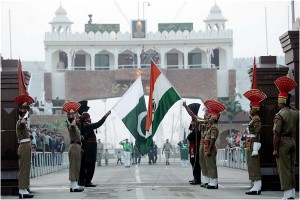
Sir,
One can only say that Pakistani citizens should stop thinking of going to India because Modi’s India is no more secular; it is fast becoming a Hindu state where no other religion or minority can survive anymore. The trip to ‘Maximum City’ turned bitter for a family from Pakistan. After visiting the iconic Haji Ali Dargah, the family of six from Karachi found that no hotel or lodge was willing to give them rooms. When their efforts to return to their relatives’ house in Jodhpur also failed, the family, which included three women and a boy, had no option but to spend the night on the footpaths. Sometime around this eid, a father and his son were lynched to death for allegedly eating beef, though later it was found that they had eaten mutton. Also, there is a resentment being expressed by the saner elements across India, including actors and writers; there is no regret being shown by the government. After what has happened to this Karachi family, one can only fear that worse will happen in the coming days.
Alya Alvi,
Rawalpindi.
Landing incident
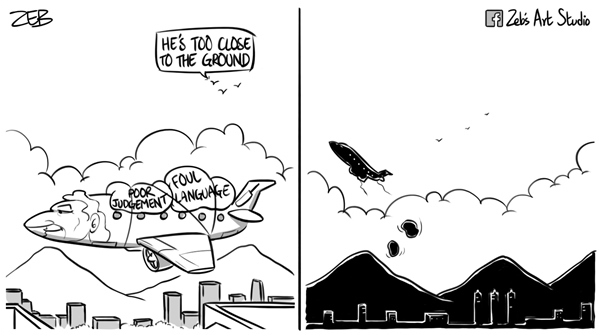
Sir,
Recently, a Shaheen Airline aircraft did an emergency landing at the Lahore airport, spreading fear and panic among those on the plane as well as those watching the harrowing scenes on TV. Only yesterday it was revealed the pilot of the aircraft had been extremely drunk and was not in control of his senses. It is only by the grace of God that no lives were lost and no major damage incurred. The authorities first need to investigate why someone who was so severely drunk was allowed to take off to begin with and then the people responsible, including the pilot, need to be severely punished. His licence needs to be stripped and he needs to be put behind the bars. We have seen too many airplane crashes these past few years around the globe and we don’t need more happening in the country.
Samia Haq,
Lahore.
Zain murder suo moto
Sir,
The decision by the chief justice to take a suo moto notice of the Zain murder trial case has come as a sigh of relief for law-abiding citizens. The acquittal of all accused had shattered the confidence and the trust of the people in the police investigation, the judicial system and the elected political government. This brutal act of terrorism had occurred not in a remote rural area, but in Lahore Cantonment, where security has been heightened to combat terrorism, yet an arrogant scion of an elite feudal family who resorted to firing resulting in the death of 16-year orphan Zain, has managed to manipulate the system to get away scot-free. The question arises, who murdered Zain?
This has become almost a routine where sons of rich elite have resorted to senseless murders, examples being the Shahzeb and Hamza murders in Karachi, yet manage to evade punishment, exploiting and abusing the Islamic concept of blood money, making a mockery of our religion, which emphasises on equality before law for all. Witnesses willing to testify are subjected to pressure by police and powerful political figures, and have to undergo intense humiliation and physical torment by repetitive adjournments in the trial process, making it difficult for regularly employed citizens to abstain from their official assignments or private businesses. Lawyers engaged by powerful criminals to defend their sons intentionally delay and seek adjournments in proceedings on technicalities in connivance with corrupt lower judiciary, till the witnesses are driven to desperation and are forced to seek a way out.
In the Zain murder trial, even his uncle, who lodged an FIR, has turned hostile. It is time such witnesses are protected and those who retract from an FIR be given strict punishment. The least the ATC could have done was to punish Mustafa Kanju and his hired bodyguards for spreading terror by resorting to indiscriminate firing, misuse of lethal weapons and posing a threat to public safety. All acquitted criminals should be arrested and forensic investigations must be launched to establish whose bullet Zain fell victim to. The involved police investigators should be sacked and criminal proceedings initiated against them if public confidence is to be restored in law enforcement.
Ali Malik Tariq,
Lahore.
Sundar factory collapse
Sir,
It is the responsibility of the state to regulate businesses, health, education etc., in such a manner that lives, safety and rights of ordinary citizens are not compromised; both the paid bureaucracy and elected government have failed in this constitutional obligation. Illegal commercial structures not conforming to safety regulations, nor meeting mandatory structural strength, exist in every nook and corner of Pakistan, in full know of corrupt and politically influenced regulators, bureaucrats and law enforcement agencies. The four-storey factory that collapsed in Sundar Industrial Estate near Lahore was one such building, declared unsafe, yet another floor was being constructed on top and it was none other but an MPA who used his political muscle to silence those responsible for the prevention of such criminal acts. Hundreds of poor labourers will die for collective criminal negligence of this culpable homicide by a corrupt bureaucracy.
Lives and liberties of ordinary citizens of Pakistan seem to have no relevance for the state. It was in Lahore Cantonment’s posh Cavalry Ground that 16-year orphan Hamza was killed by bullets fired by Mustafa Kanju and his private guards, and nobody was prosecuted. Only recently a young journalist, Bilal, was crushed under the wheels of a car driven by the son of a DSP in Lahore. In Karachi, thousands of citizens have perished in a battle for turf, yet in the name of political reconciliation, murderers have been let off. In September 2012, over 289 innocent labourers were burned alive in a Karachi garment factory, which was torched by criminals for refusal to pay extortion, and yet nobody has been successfully prosecuted. As long as there is no accountability for what amounts to culpable homicide, such irregularities will continue and other than condemnation by elected public officeholders, or the announcement of paltry compensation followed by the formation of a committee, the status quo prevails.
Tariq Ali,
Lahore.
Son of the soil
Sir,
Seems like yesterday, but decades ago a war broke out between Pakistan and India. One of the biggest heroes of the war turned out to be Major Shabbir Sharif. He laid down his life fighting to protect his motherland. He was a man unmatched in compassion and when his motherland called out for help, he rushed to her rescue. As he was a martyr in the war, he found residence directly in heaven. Shabbir Sharif’s valiant attitude has given birth to numerous tales of his bravery. These tales remind us how much we need men like him in our ranks, no matter what the field. His valor and heroic courage has left strong impressions on the minds of many; both men and women. His legacy includes Pakistan’s current Army Chief General Raheel Sharif, who is not only his descendant but also claims to be inspired by him. May his soul be blessed in the afterlife.
Nasir Mahmud,
Lahore.
Losing faith
Sir,
I grew up admiring Imran Khan for his bowling action. As a schoolboy, I raised funds for him. Playing cricket in the streets of Lahore, I aspired to channel his cornered-tiger’s spirit. When he first launched his political party, I hoped that he would succeed. As time passed, and he appeared more often on television, my admiration turned to respect.
For years I respected him quietly, with no hope of his success, as he languished at the fringes of Pakistan’s politics — almost as a joke. Then history turned the page and one day we woke up and found that his rise to power was imminent. In the last few years though, he has not succeeded in his mission to become prime minister, his actions have often disappointed. He is after all, like many others before him, a politician. Not always truthful, and full of contradictions.
More recently, I have been let down by his choice of associates, known members of the status-quo, men and women unlikely to bring transformative governance to our country. In the last few days, I have seen his faults more clearly than before. He showed poor judgment and a lack of self-awareness in marriage. He has been hasty and quick-tempered. Most distressing for me have been the rumors, spread supposedly by his own associates, about his wife’s many failings. Intimate accounts that could not come out without him condoning, if not approving, them.
However, I am surprised to find, none of this has changed things for me. I have felt pity for him, as he grapples with this public embarrassment. I loved him in the past from a distance, loved him with blind faith. Now, when there are no excuses left to be made for him, I love him like we love a fallen, with deep concern and superstitious fervor — unreservedly, knowing that he was never the man I first idolised. But knowing also that it does not matter.
Munib A. Khan,
Lahore.
Seismic realities
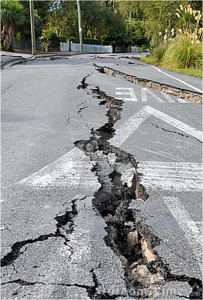
Sir,
The recent earthquake that sent tremors across Afghanistan and Pakistan, and unleashed havoc on hundreds of individuals, has once again brought to light the notion of man being responsible for the perpetuation of such natural calamities. Although most point towards the nation bringing upon itself such calamities by turning towards acts of sins, the area of concern that truly needs to be looked at is the environmental imbalance being brought about by man through global warming.
Shortly after the heart wrenching 7.8 magnitude earthquake that hit Nepal this year in April, leaving around 3,500 people dead and another 6,500 critically injured, a research conducted by eminent geoscientists and geologists necessitated the role of global warming in the increase in the frequency and magnitude of earthquakes and volcanic eruptions throughout the globe. Global warming, the gradual increase in the temperature of the earth, is perpetuated by increased levels of harmful greenhouse gases as the CO in the atmosphere, which is a direct repercussion of human activities as deforestation, mining, fossil fuel burning, which in turn paves the way for climate change.
Global warming shares a close nexus with the occurrence of earthquakes, since in causing excessive melting of glaciers and ice bodies on the planet, it drastically reduces the weight on the earth’s crust and leads to the occurrence of the phenomena “isostatic bounce”, in which the earth’s crust bounces back, leading to increased seismic activity and abnormal movement of tectonic plates beneath the earth’s crust. The earthquake that afflicted Afghanistan and Pakistan is a grim manifestation of this gross reality. Sensibility demands that the international community realises the gravity of the havoc being wrecked on nations due to uncontrolled increase in global warming, which is bringing national and individual lives to a standstill. Afflictions of natural disasters as earthquakes cannot be averted unless or until global society engages in an effective practical campaign to reduce global warming, the root of all such disasters.
Marria Qibtia Sikandar Nagra,
Lahore.
Historic tragedy
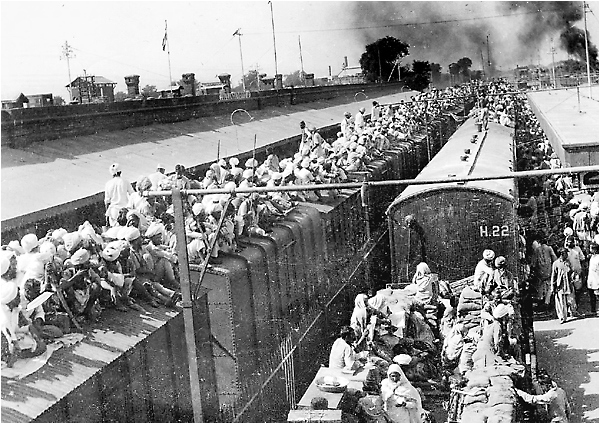
Sir,
I am an Indian, and I am a fan of newspapers like the News International, Express Tribune, and The Friday times. In the last latest edition of the TFT, I read a heart-moving piece on partition titled “ Escape of Paradise”. I can feel what kind of fear would have passed through while crossing through India en route to Pakistan. My grandfather was regional manager of Burma Shell in Karachi, and they used to live in a place called Bundar Bazaar. During partition, they had to leave the comforts of their mansion in Karachi, and my mother used to tell us stories of mass murder in trains that were travelling between the countries. They feared for their lives, up till the time that they reached India.
R. Nagarajan,
Delhi.
The Friday Times, Plot No 52-53, N-Block, Main Guru Mangat Road, Gulberg II, Lahore, Pakistan. 042.35779186; Fax: 042.35779186, email: tft@thefridaytimes.com
*Letters must carry addresses and phone numbers
*We ask you to restrict your comments to 300 words.
Cartoons by Zeb's Art Studio

